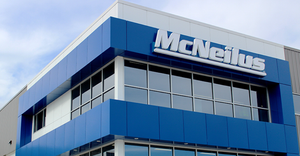Waste Connections, Waste Management Deliver Q4 Results, 2019 Outlook
During calls with investors, Waste Connections and Waste Management reported strong fourth quarter 2018 results and provided outlooks for 2019.

Waste Connections and Waste Management reported their fourth quarter 2018 results, overall year-end results for 2018 and provided their respective business outlooks for 2019 during calls with investors on February 14. Here are key highlights from both of those calls.
Despite Recycling Headwinds, Waste Connections’ Q4 Exceeds Expectations
Toronto-based Waste Connections Inc. announced its results for the fourth quarter of 2018 and provided its outlook for 2019. Despite recycling headwinds, revenue for the fourth quarter totaled $1.262 billion, up from $1.157 billion in the prior year period.
“2018 finished on a high note, as financial results for the fourth quarter exceeded expectations on better-than-expected solid waste organic growth, E&P waste activity and acquisition contribution," said Ronald J. Mittelstaedt, chairman and CEO of Waste Connections, in a statement. "We are also extremely pleased with our results for the full year, as adjusted EBITDA as a percent of revenue expanded 30 basis points and adjusted free cash flow increased 15.2 percent. Increases in both solid waste pricing growth, which was up 130 basis points year-over-year to 4.5 percent, and E&P waste activity enabled us to overcome the precipitous decline in recycled commodity values and certain cost pressures noted during the year. The strength of these results continues to reflect the benefits of our purposeful culture, differentiated strategy and disciplined execution.”
“2018 was also noteworthy for the continuing elevated pace of acquisition activity,” he added. “Our acquisition of American Disposal in the fourth quarter brought total annualized acquired revenue to more than $360 million for the year, with rollover revenue contribution of approximately $200 million in 2019. Along with continued strong pricing growth, this already positions us for high single-digit revenue growth and another 30 basis points adjusted EBITDA margin expansion in 2019, with any growth in solid waste volumes, E&P waste activity or additional acquisitions providing further upside. We have increased adjusted free cash flow per share at a compounded rate of more than 15 percent per year over the past several years and expect continuing double-digit per share growth in the upcoming year. Our strong financial profile continues to afford the flexibility to fund outsized acquisition activity, an increasing cash dividend and opportunistic share repurchases.”
Mittelstaedt was not on the call with investors due to a family medical emergency. Waste Connections President Worthing Jackman filled in during the February 14 call.
Here are some of the company’s Q4 2018 highlights:
Revenue in the fourth quarter totaled $1.262 billion, up from $1.157 billion in the prior year period. Operating income, which included $14 million of impairments and other operating items and $2.8 million of acquisition-related costs, was $200 million. This compares to $175 million in the prior year period, which included $15.2 million of impairments and other operating items and $7 million of acquisition-related costs.
Net income attributable to Waste Connections in the fourth quarter was $132.5 million, or $0.50 per share on a diluted basis of 264.5 million shares. In the prior year period, the company reported $315.1 million, or $1.19 per share on a diluted basis of 264.6 million shares; this included a $209.4 million benefit to the income tax provision primarily resulting from enactment of the Tax Cuts and Jobs Act of 2017.
Adjusted net income attributable to Waste Connections in the fourth quarter was $166.2 million, or $0.63 per share, versus $137 million, or $0.52 per share, in the prior year period. Adjusted EBITDA in the fourth quarter was $397.2 million, as compared to adjusted EBITDA of $360.7 million in the prior year period.
Full year 2018 highlights include:
For the year ending December 31, 2018, revenue was $4.923 billion, as compared to revenue of $4.630 billion in 2017. Operating income, which included $40.7 million of impairments and other operating items, fair value accounting changes to certain equity awards and other acquisition-related costs, was $832.2 million. This compares to operating income of $627.1 million in the prior year, which included $189.2 million of expenses primarily related to both goodwill impairment against the company’s E&P segment resulting from the early adoption of Financial Accounting Standards Board’s recent accounting pronouncement simplifying the test for goodwill impairment, and impairments and other operating items mostly related to the divestiture or expected divestiture of certain assets acquired in the Progressive Waste acquisition.
Net income attributable to Waste Connections in 2018 was $546.9 million, or $2.07 per share on a diluted basis of 264.4 million shares. In 2017, the company reported net income attributable to Waste Connections of $576.8 million, or $2.18 per share on a diluted basis of 264.3 million shares; this included a $205.6 million benefit to the income tax provision primarily related to the Tax Act.
Adjusted net income attributable to Waste Connections in 2018 was $667.3 million, or $2.52 per share, compared to $570.7 million, or $2.16 per share, in the prior year. Adjusted EBITDA of $1.566 billion, or 31.8 percent of revenue, was up 7.3 percent and 30 basis points year-over-year. That is compared to $1.461 billion in the prior year. Net cash provided by operating activities were $1.411 billion, up 18.9 percent. Adjusted free cash flow was $879.9 million, or 17.9 percent of revenue, up 15.2 percent.
2019 Outlook:
The company expects revenue of approximately $5.31 billion, excluding additional acquisitions, with remaining shedding of poor-quality revenue, primarily due to the City of New York Department of Sanitation (DSNY) marine terminal operations contract with a third party. Underlying volumes are expected to be essentially flat, said the company’s CFO Mary Anne Whitney during the call with investors.
Outlook for Q1 2019: Revenue is estimated to be approximately $1.24 billion. “We expect pricing growth for solid waste to be in the range of 4.5 percent to 5 percent in Q1, with volume at about negative 1 percent, in part, due to the purposeful shedding from the impact of the City of New York Department of Sanitation’s marine terminal operations contract and additional impact from severe winter weather conditions,” Whitney explained during the call.
Waste Connections expects an adjusted EBITDA margin expansion of 30 basis points year-over-year.
Expected net cash provided by operating activities of approximately $1.525 billion and double-digit adjusted free cash flow per share growth.
Net income attributable to Waste Connections is estimated at approximately $636 million.
Adjusted EBITDA is estimated at approximately $1.705 billion, or about 32.1 percent of revenue.
Adjusted free cash flow is estimated to be approximately $950 million, or 17.9 percent of revenue. Impact from proposed regulations has already been considered.
“Late in December 2018, the IRS released proposed regulations associated with the Tax Act that we believe, if finalized, could impact our current tax rate of 21.5 percent,” said Whitney. ��“We estimate that our resulting estimated tax rate for 2019 could range between 21.5 percent and 26.5 percent range. The proposed regs are not expected to be finalized until about June. That timing will impact our effective tax rate from quarter to quarter.”
“2018 was a truly remarkable year considering the challenges that we overcame and the results we delivered to drive our 15th consecutive year of positive shareholder returns,” noted Jackman during the call. “Completing another outsized year of acquisitions, overcoming the headwinds of recycling, certain cost pressures and lower margin acquisitions to drive reported margin expansion for reducing the frequency of safety-related incidents would be noteworthy in any environment, but even more so when faced with constraints of low unemployment in many markets. These accomplishments would not have been possible without the tireless efforts of our over 16,000 dedicated employees.”
“Given the headwinds that we were able to overcome in 2018, we appreciate the greater visibility we have coming into 2019,” added Jackman. “High single-digit revenue growth is already in place, adjusted EBITDA margin expansion and another year of targeted double-digit adjusted free cash flow growth.”
Waste Management Sees Record-setting Growth for 2018
During its call with investors, Houston-based Waste Management reported revenues for the fourth quarter of 2018 were $3.84 billion, compared with $3.65 billion for the same 2017 period.
“At this time last year, I was telling you that 2017 was arguably the best year we’ve seen,” said Jim Fish, president and CEO of Waste Management, during the call. “I am pleased to report that the 2018 results were even better. For the year, our business grew operating EBITDA, which is the best reflection of the health of our business. We grew operating EBITDA by more than 5 percent despite the worst recycling headwinds we’ve seen in over a decade.”
Net income for Q4 2018 was $531 million, or $1.24 per diluted share, compared with net income of $903 million, or $2.06 per diluted share, for the fourth quarter of 2017. On an adjusted basis, earnings per diluted share were $1.13 for the fourth quarter of 2018, compared with $0.85 for the fourth quarter of 2017.
For the full year 2018, the company reported revenues of $14.91 billion, compared with $14.49 billion for 2017. Earnings per diluted share were $4.45 for the full year 2018, compared with $4.41 for the full year 2017. On an adjusted basis, earnings per diluted share were $4.20 for the full year 2018, versus $3.22 for the full year 2017.
“2018 was a record-setting year for Waste Management, driven by our traditional solid waste performance,” said Fish in a statement. “We grew operating EBITDA by more than 5 percent, which led to an increase in net cash provided by operations of more than 12 percent to $3.57 billion. This growth translated into free cash flow of over $2 billion and the most cash returned to our shareholders in over a decade. Our strong 2018 results validate that our focus on outstanding customer experience and cost management drives solid growth in our business.”
Here are the company’s key highlights for Q4 and the full year 2018:
Operating EBITDA was $1.14 billion for Q4 2018 and $4.27 billion for the full year. Adjusted operating EBITDA was $1.09 billion for Q4 2018 and $4.22 billion for the full year. On a year-over-year basis, adjusted operating EBITDA grew $73 million, or 7.2 percent, in the fourth quarter and $210 million, or 5.2 percent, for the year. Adjusted operating EBITDA margin improved 50 basis points in the fourth quarter and 60 basis points for the full year.
In the fourth quarter, revenue growth was driven by strong yield and volume growth in the company’s collection and disposal business, which contributed $203 million of incremental revenue on a year-over-year basis. Revenue from the company’s recycling business increased $18 million in Q4 2018. For the full year, yield and volume growth in the company’s collection and disposal business contributed $693 million of incremental revenue. This was partially offset by a decline in revenue from the company’s recycling business, which fell by $197 million year-over-year, due to lower market prices for commodities net of contamination fees.
Core price was 5.6 percent in Q4 2018, compared to 4.8 percent in Q4 2017. For the full year, core price was 5.3 percent, compared to 4.8 percent in 2017.
Internal revenue growth from yield for collection and disposal operations was 2.3 percent for both the fourth quarter and the full year, compared with 2.2 percent in Q4 2017 and 2 percent for the full year 2017.
Traditional solid waste internal revenue growth from volume was 3.1 percent in Q4 2018, or 2.4 percent, on a workday-adjusted basis. Total company internal revenue growth from volume, which includes recycling and other businesses, was 4.7 percent in the fourth quarter, or 4 percent on a workday adjusted basis. For the full year 2018, traditional solid waste internal revenue growth from volume was 2.9 percent and total company volume was 3.3 percent.
Operating EBITDA in the company’s recycling line of business improved modestly when comparing Q4 2018 with the prior year period as the company executed on its contamination fee strategy. For the full year, operating EBITDA in the company’s recycling line of business declined nearly $90 million when compared to the full year 2017.
Waste Management focused on managing SG&A to reduce costs as a percentage of revenue to below 10 percent for the first time since 2005. As a percent of revenue, SG&A expenses were 9.6 percent in Q4 2018, compared to 10.1 percent in Q4 2017. For the full year, as a percentage of revenue, SG&A expenses were 9.7 percent, compared to 10.1 percent for the full year 2017.
Net cash provided by operating activities was $912 million in the fourth quarter compared to $792 million in the fourth quarter of 2017. For the full year, net cash provided by operating activities was $3.57 billion, compared to $3.18 billion for the full year of 2017. The increase in operating cash flow for the quarter and the year reflects the benefits of strong operating income growth and lower cash taxes, which were partially offset by the payment of approximately $65 million in bonuses to the company’s front-line employees.
Capital expenditures were $454 million in the fourth quarter, compared to $528 million in Q4 2017. For the full year, capital expenditures were $1.69 billion, compared to $1.51 billion for the full year of 2017. The year-over-year increase was in line with expectations as the company invested a significant portion of its tax savings in facility improvements, natural gas fueling infrastructure and expanding its natural gas fleet.
Free cash flow was $560 million, including $102 million in asset sales, in the fourth quarter, compared to $344 million, including $80 million in asset sales, in Q4 2017. For the full year, free cash flow was $2.08 billion, including $208 million in asset sales, compared to $1.77 billion, including $99 million in asset sales, for the full year of 2017.
The company returned $451 million to shareholders in the fourth quarter comprising $197 million in dividends and $254 million in share repurchases. For the full year, the company returned $1.8 billion to shareholders comprising $802 million in dividends and $1 billion in share repurchases.
Waste Management spent $466 million on acquisitions of solid waste businesses during 2018, $118 million of which was spent in the fourth quarter.
The company’s effective tax rate for Q4 2018 was 19.3 percent. On an adjusted basis, the tax rate was 21.5 percent. For the full year, the company’s effective tax rate was 19 percent. On an adjusted basis, the tax rate was 22.1 percent.
2019 Outlook:
Adjusted operating EBITDA is expected to grow $185 million to $235 million to between $4.40 billion and $4.45 billion for the full year.
Adjusted earnings per diluted share for 2019 is expected to be between $4.28 and $4.38.
Core price is expected to be greater than 4 percent for 2019. Internal revenue growth from yield on the collection and disposal business is expected to be greater than 2 percent. Internal revenue growth from volume is expected to be around 2 percent.
Free cash flow for 2019 is projected to be between $2.025 billion and $2.075 billion.
Capital expenditures are expected to be in the range of $1.65 billion to $1.75 billion, with proceeds from asset sales projected to be $50 million to $100 million.
The Board of Directors has indicated its intention to increase the dividend by $0.19, or 10.2 percent, to $2.05 per share on an annual basis, for an approximate annual cost of $870 million.
In 2019, the company expects another year of above average merger and acquisition activity, noted Fish during the call with investors.
The company expects its full-year adjusted effective tax rate to be approximately 24 percent—about two percentage points higher than what the company saw in 2018, noted CFO Devina Rankin during the call.
“We expect strong growth trend to continue into 2019 through investments in people, fleet and technology,” explained Chief Operating Officer John Morris during the call. “Last year, we invested a portion of our tax savings into our employees, and this year, in addition to continuing to updating our fleet, we will continue to invest in our employees through wage increases, facility improvements and additional driver training facility, which will open in the first half of this year. By the end of 2019, we expect to have over 60 percent of our routed vehicles running on natural gas, and we know there is a significant maintenance savings with natural gas compared with diesel trucks as they age.”
“Turning to recycling, we performed well in the fourth quarter with continued focus on improving operating costs and successfully battling contamination,” he added. “In 2019, we will continue to invest in the MRF [materials recovery facility] of the future and further improve operating costs and optimizing plans to meet our customer requirements.”
Rankin noted that the company’s fourth quarter results were in many ways the strongest Waste Management saw all year, “allowing us to close out 2018 on a strong note in which we either met or exceeded all our expectations,” she said.
She explained that the top two financial priorities are growing operating EBITDA and leveraging that growth to convert more earnings of free cash flow. In 2018, she noted, the company delivered on each of those priorities.
“The health of our business is best demonstrated by the strong 2018 operating EBITDA performance generated by our hardworking employees,” said Fish in a statement. “We expect equally strong operating EBITDA growth again in 2019. We will continue to make investments in our employees, in technology and in capital equipment this year to further grow our business, improve customer service and generate strong returns. We are confident that these investments will position us well for 2019 and into the future.”
About the Author
You May Also Like




